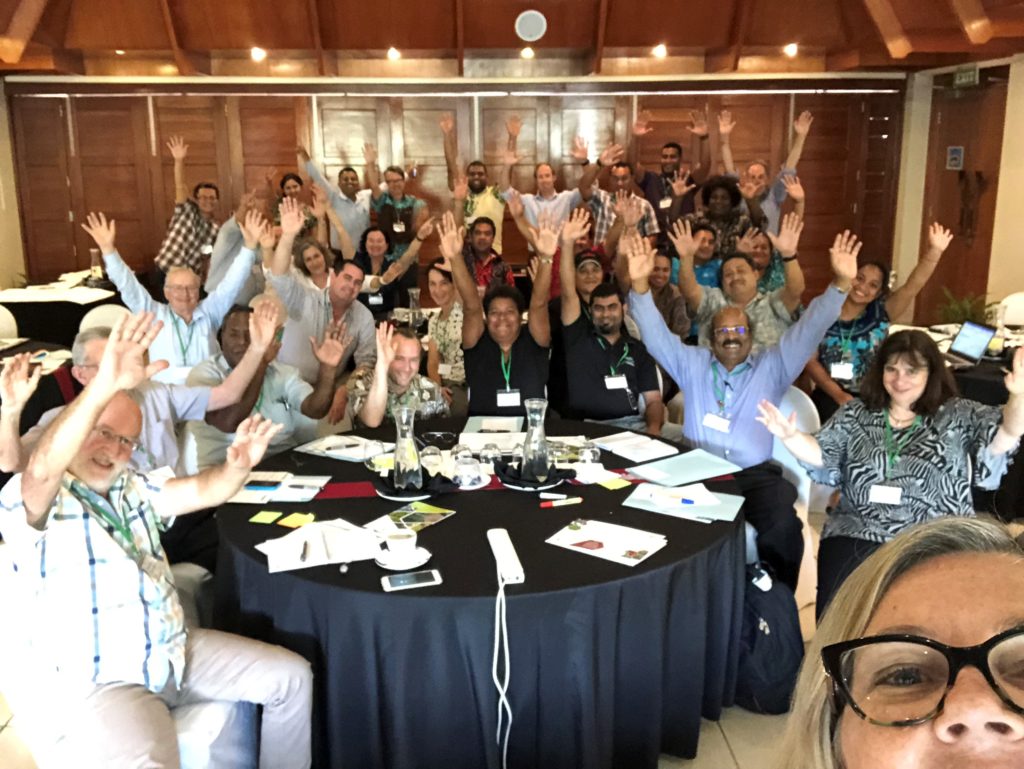

PACIFIC BIOSECURITY CHAMPIONS
July 10, 2018
The Crawford Fund was a proud partner in the Australia-Africa Plant Biosecurity Partnership, which was funded through the Australian Centre for International Agricultural Research (ACIAR) and coordinated by a consortium comprising the Plant Biosecurity CRC, the Crawford Fund and CABI. The Partnership involved training a set of Biosecurity Fellows or ‘champions’ to be the first members of the Africa Plant Biosecurity Network, to improve plant biosecurity and safe trade of agricultural products in ten east and southern African countries.
A new program is now using the best elements and lessons learned from that Partnership for a capacity building program for Pacific plant biosecurity ‘champions’.

Dr Colin Chartres, our CEO, attended the Pacific Plant Biosecurity Capacity Building Workshop in Nadi, Fiji on 26 and 27 June and has written the following workshop communique including details of the next steps in this important work which, like the AAPBP, aims to build a sustainable and regional network of biosecurity change agents.
WORKSHOP COMMUNIQUE
Access to international markets, food security and thus the economies of many Pacific nations are threatened by invasive pests and diseases. These include a wide range of both established and emerging pests and diseases with country specific and regional impacts. The general consensus is that these threats are growing because of increasing trade in agricultural commodities, increasing tourism and international travel and the impacts of climate change that enable new pests and diseases to spread across agricultural systems.
All countries in the Pacific region are working hard to mitigate existing threats and potential future risks, but more can be done in terms of capacity building for biosecurity staff and strengthening biosecurity institutions. To this end the Australian Centre for International Agricultural Research (ACIAR) is developing a capacity building program for Pacific plant biosecurity addressing both technical skills, as well as communication and advocacy skills through ‘on the job’ placements in Australia and New Zealand, along with workshops in the Pacific region.
The Pacific Island nations currently targeted include Papua New Guinea, Fiji, Kiribati, Samoa, Solomon Islands, Tonga, Tuvalu and Vanuatu with potential to include additional nations and participants with co-financing arrangements. The workshop participants included representation from 10 countries and 13 development partners (e.g. government departments, similar programs, international donor agencies, R&D agencies, NGOs and the private sector).
The workshop goals were to define training needs that will:
- improve performance and capacity of biosecurity agencies,
- improve supply chain compliance,
- enhance value chains for selected commodities with respect to market access,
- improve food security and livelihoods across the region.
Participants were asked to identify current and potential threats across the Pacific region and to consider existing capability strengths and weaknesses in national plant protection organisations in the regional countries. The results demonstrated varying levels of scientific/technical and operational capability in the region, similar variability of overarching institutional, policy and regulatory support and limited linkages to the private sector.
This preliminary analysis also identified 57 specific pest and diseases as either current threats or risks and 77% of pests and diseases showed commonality with other countries. Other key issues raised included lack of appropriate infrastructure and equipment, outdated policy, legislation and regulations, concerns about lack of shared surveillance information, limited emergency response capabilities and market access barriers due to inadequate treatment facilities.
Given a major goal of the program is to build a sustainable and regional network of biosecurity change agents, participants also discussed how the fellows could make a positive difference in the region.
Key outcomes of the meeting included the commencement of initial stages in developing a fellowship scheme which will take into account country specific key issues and build on existing knowledge, networks and systems. Fellows will be selected from Pacific nations and will spend three weeks placed with Australian and New Zealand biosecurity agencies and two weeks in market access simulations and communications training. A key role for them will be to build their capacity to train others, including private sector players in their home countries.
The training will be tailored to focus on developing technical skills specific to each countries’ needs, as well as specialist communications, stakeholder engagement and advocacy capability development. Particular attention will also be focused on how linkages with the private sector can be strengthened to facilitate a total supply chain understanding and approach to biosecurity that will enhance market access opportunities for regional production.





